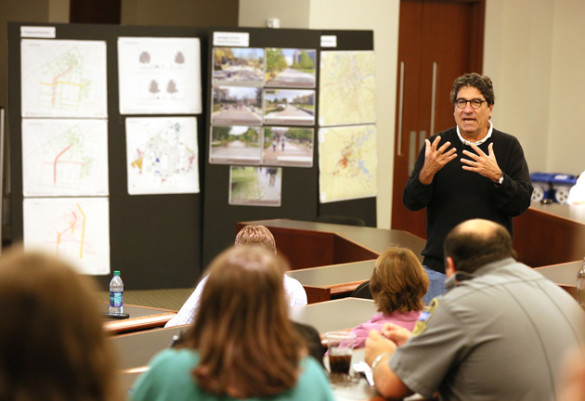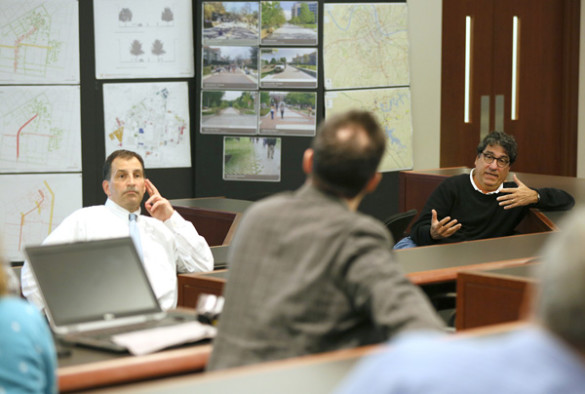
A series of working groups comprising students, faculty and staff is launching at the Wond’ry, the university’s new innovation center, to generate recommendations about the future of transportation on the Vanderbilt campus. Chancellor Nicholas S. Zeppos announced the working groups Oct. 28 at a town hall meeting held as part of FutureVU, the university’s land use planning process. More than 130 members of the Vanderbilt community attended the meeting in Flynn Auditorium.
“This is a historical moment for our students, faculty and staff to come together as a community and discuss our future and our responsibilities as intergenerational stewards of this sacred space—our land,” Zeppos said. “We have never before had this moment in time where we engaged as a community in continuous conversation about sustainability, walkability, environmental impacts and our connection to the city around us.”
Vice Chancellor for Administration Eric Kopstain, who is leading FutureVU, pointed to Nashville’s rapid growth, the separation of the university and Medical Center and the ongoing implementation of the Academic Strategic Plan as key factors that make now an ideal time to plan for the future of the campus and for transportation.

“Nashville is growing dramatically all around us, and we must take an active role in shaping the impacts of that growth on our university as well as the possibilities it offers to us. In addition, the separation of the university and medical center has given us a new opportunity to think of what we want to be, uniquely, as a university,” he said. “With the Academic Strategic Plan, we have a foundational blueprint for our intellectual and teaching opportunities to which to tether this work on our physical aspirations.”
A focus of the town hall discussion was the need to provide alternatives to cars as the primary mode of transportation to and from campus in order to make better use of the campus footprint, improve sustainability and offer healthier, more flexible ways of traveling. Eighty-two of the university’s 330 acres, or roughly 25 percent, are currently dedicated to parking.
“We cannot grow more land, so any decisions about the use of our campus become trade-off decisions,” Zeppos said. “We must always ask ourselves, what is the highest and best use of this precious resource, and can we really make the argument that parking aligns with our mission as that best use?”
The FutureVU team has been meeting with constituents on campus and across Nashville and studying best practices at other universities and cities as well as lessons learned abroad to understand the multi-layered issues that connect back to transportation issues and needs on campus, including the distribution of Vanderbilt’s own workforce in Nashville.
“Our data shows that many of our employees who may benefit most from public transportation live in areas that are not currently well served by it,” Kopstain said. “This is something that we need to understand and incorporate into our evaluation for possible solutions for our employees, as well as in conversations with the city of Nashville.”
Zeppos and Kopstain stressed the importance of Vanderbilt community involvement through the working groups and other opportunities as being critical to identifying solutions and future direction for transportation options and needs on campus, and emphasized that any changes to parking or other areas will only occur after thorough study and dialogue by the campus community.
“We believe strongly in leading with solutions. We want to invite you into this space to learn and to dialogue, and we challenge you to develop and present ideas that are cutting edge,” Zeppos said. “It is our goal that we will come together as a diverse, engaged and learned community with many different backgrounds and experiences to develop a creative and engaged plan.”
The new working groups are being launched in partnership with the Wond’ry and the Turner Family Center for Social Ventures at the Owen Graduate School of Management.
“Innovation and fresh insights are best developed when diverse groups come together in inclusive teams to share their perspectives and points of view,” Robert Grajewski, Evans Family Executive Director of the Wond’ry, said. “As the epicenter for innovation and entrepreneurship at Vanderbilt, the Wond’ry is the ideal location for creating these trans-institutional teams to tackle the topic of maximizing the usage of our land. We are excited to partner with the FutureVU committee and the Turner Family Center in this effort.”
They will be charged specifically with formulating actionable steps the university can take related to:
- Metropolitan Transit Authority / Regional Transportation Authority bus and train adjustments to better service Vanderbilt;
- Vanderbilt shuttle adjustments;
- Expansion of Uber and Lyft opportunities on campus:
- Expansion of on-campus biking infrastructure and bike programs;
- Potential alternative work arrangements; and
- Other partnerships and opportunities.
Visit the Wond’ry website to join a FutureVU Transportation Working Group >